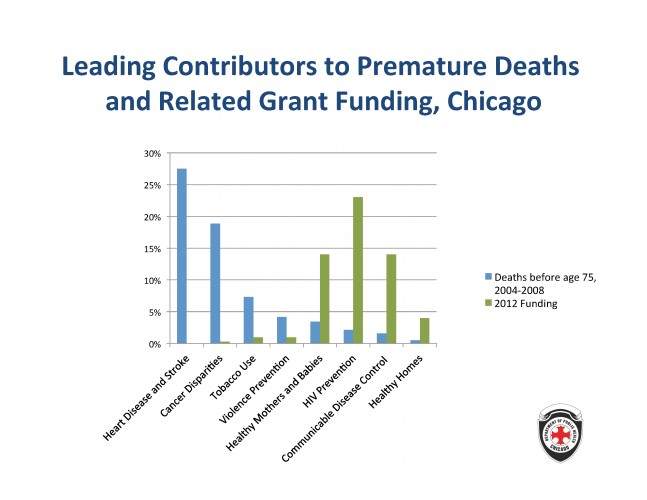The disease that causes the most premature deaths in Chicago receives the least amount of federal funding, according to a report presented Wednesday to the Chicago Board of Health.
The report, presented by Chicago Department of Public Health Deputy Commissioner Erica Salem, showed a stark contrast between the causes of premature death among Chicagoans and the money dedicated to treating and preventing those deaths.
“There is no clear connection between public health needs and public health funding,” Salem said.

One graph that received special attention from board members compared the leading causes of deaths before the age of 75 and levels of funding.
Heart disease, cancer, stroke and tobacco use are the four leading causes of death in Chicago, but they received the least amount of money in 2012. HIV and communicable diseases rank as the seventh and eighth contributing factors, but are tops in federal funding.
Board member Melanie Dreher called the graph “so revealing” about the “problems with disease-based … funding,” while Dr. Horace E. Smith said it showed “a clear disparity” between needs and money spent.
“This is not the only source of funding, but it’s an important source. It’s not just how much money but the allocation of the money,” said Smith, another board member.
Salem’s graph on disproportionate funding was part of a larger report she presented with Public Health Administrator Berenice Tow about the health department’s focus on heart disease and stroke, which rank as the first- and third-leading causes of death in Chicago.
In 2006, the most recent year data is available, 6,646 Chicagoans died as a result of heart disease or stroke.
Chicago has shown progress in lowering obesity, a significant risk factor for heart disease, but 2010 data shows incidents of heart attacks and strokes rising.
Combined, the two accounted for 27.5 percent of premature deaths between 2004 and 2008, but there was almost no grant funding dedicated to heart attacks and strokes in 2012.
Compare that to HIV prevention, which made up 23 percent of the grant funding Chicago received in 2012 but caused just 2 percent of all premature deaths. In Chicago’s 2006 report on the leading causes of death in the city HIV/AIDS did not rank in the top 10.
Both Smith and Salem pointed to AIDS activism and increased public attention for the inequity.
“It’s whatever is popular, whatever is new,” Smith said. “You look at when HIV was on the news a lot and it got a lot of attention, so funding went up. And it’s still skewed toward HIV even though there are other things killing more people.”
Salem said almost all of the department’s grant funding comes from the U.S. government, and the federal agencies distributing the money decide how it can be spent.
“We apply for what’s out there,” she said.
In 2012, Chicago’s Department of Public Health received $123.5 million in grants, accounting for 83 percent of the department’s $148.9 million budget.
Next year’s proposed budget features more of the same disparity Smith is worried about
While heart disease and stroke still lead the way in premature deaths, they did not merit a line item on the 2013 budget, which does include specific allocations for HIV/AIDS, tuberculosis, STIs and communicable disease.
The prevention and treatment of HIV/AIDS makes up 38 percent of the proposed budget for the department, and the $56.9 million allocated is more than triple the amount for the next highest area.












Be First to Comment